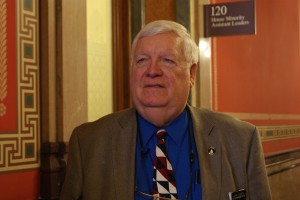Sheets Snapshot – February 16, 2017
This is clearly the most difficult Session I’ve been in. We have had a number of topics come up in the past couple weeks that have had passionate views on both sides of the issue. We started with passing State Supplemental State Aid (SSA) late into the night Monday (2/6) with an increase to K-12 Schools of $40 Million. Then on Tuesday (2/7), in a raucous Public Safety Committee we voted to make sanctuary cities, and other such entities, illegal in Iowa. On Wednesday (2/8) House opened Chapter 20 discussions on public collective bargaining reform, and we’ve been working on it until the affirmative House vote on Thursday (2/16).
There has been fear-mongering and obstruction by the unions and their political helpers to frighten the public workers. Collective bargaining advocates are arguing the existing law has worked well for 40 years and changes are not necessary. Yet that did not stop those same advocates from serious attempts to significantly expand collective bargaining in 2007 and 2008. Doing the best that I can without having a lawyer’s training, I’d like to present several points that need to be emphasized:
- The scope of negotiations outlined in Chapter 20 only refers to the ability of a union to bargain those items with an employer. The changes in the bill have no effect on an individual employee’s rights to discuss or negotiate on their own accord with their employer about any topics they feel are imperative to their employment.
- HF291 doesn’t affect private sector workers. The Federal Government has jurisdiction over private sector labor relations and reforms to Chapter 20 does not change this fact.
- The bill doesn’t take away or modify Iowa’s public pensions. In Iowa, public pensions have always been excluded from the scope of collective bargaining.
- The bill doesn’t take away health insurance. Page 46, line 3 of bill explicitly states the employer must offer health insurance to full time employees.
- The bill does not remove “proper cause” protections for public employees.
- Public safety employees are exempt from the changes made in HF291.
- Employees have protections against discrimination, harassment, retaliation or any other unlawful practices. It is already illegal for employers to discriminate against employees on based on protected characteristics such as basis of race, color, religion, age, sex (including pregnancy), national origin, creed, sexual orientation, sexual identity or disability. This bill does nothing to undo those protections.
- One of the most significant features of HF291 is that it makes the union bosses more responsive to, and representative of, the members of the workplace. The old law only required a majority of those present at a certification meeting to become certified (to be potentially represented by a union). So if there were 100 workers, and 20 showed up for a certification meeting, 11 yes votes would certify that union and make it the sole negotiating organization. The HF 291 requires at least 50% plus 1 to do the same thing. So for this hypothetical workforce, 51 members would have to vote for the union to represent them in contract negotiations.
- The second most significant feature is that each union must be recertified by its members in the year preceding a collective bargaining. This means the union bosses must make a convincing argument to their members as often as they negotiate for them.
The result of this Bill is that school boards, mayors, city councilors, county supervisors along with state government leaders will have more flexibility to do the jobs taxpayers elected them to do. This is to manage state resources and quickly and effectively respond to their concerns.
Public employees will be afforded more freedom, choice and independence in the workplace. They will finally have the ability to directly influence their take home pay based on individual performance.
On a different issue important to many of us, House Republicans have approved measures which oppose taxpayer funding for abortion providers. Senate File 2, which is currently on the Senate Debate Calendar, addresses this issue. Planned Parenthood is an abortion provider in Iowa and is worried about losing state funding as a result of potential new restrictions that may be approved by the 2017 Legislature. A simple solution is for Planned Parenthood to stop conducting abortions. By ending the practice, no taxpayer dollars would be in jeopardy.
* March 4: League of Women Voters @ 10am at the Market on Main Street
* February 18: “Legislative Coffee” @ 10am in Centerville at the office of Chariton Planning and Development; 308 North 12th Street.
















